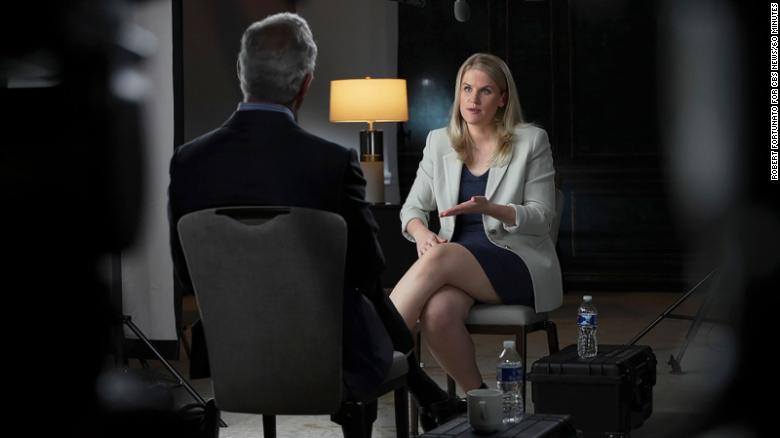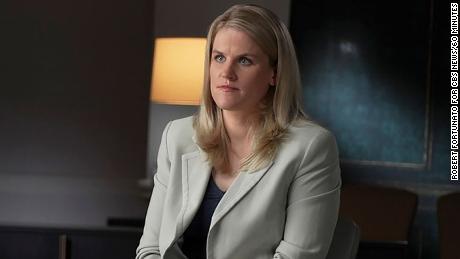Sorry, nothing in cart.
Facebook whistleblower revealed on s’60 Minutess’ says the company prioritized profit over public goods
Facebook whistleblower revealed on ’60 Minutes‘ says the company prioritized profit over public good
The identity of the Facebook whistleblower who released tens of thousands of pages of internal research and documents — leading to a firestorm for the social media company in recent weeks — was revealed on “60 Minutes” Sunday night as Frances Haugen.
The 37-year-old former Facebook product manager who worked on civic integrity issues at the company says the documents show that Facebook knows its platforms are used to spread hate, violence and misinformation, and that the company has tried to hide that evidence.
“The thing I saw at Facebook over and over again was there were conflicts of interest between what was good for the public and what was good for Facebook, and Facebook over and over again chose to optimize for its own interests, like making more money,” Haugen told “60 Minutes.”
“60 Minutes” correspondent Scott Pelly quoted one internal Facebook (FB) document as saying: “We have evidence from a variety of sources that hate speech, divisive political speech and misinformation on Facebook and the family of apps are affecting societies around the world.”
About a month ago, Haugen filed at least eight complaints with the Securities and Exchange Commission alleging that the company is hiding research about its shortcomings from investors and the public. She also shared the documents with the Wall Street Journal, which published a multi-part investigation showing that Facebook was aware of problems with its apps, including the negative effects of misinformation and the harm caused, especially to young girls, by Instagram.
Haugen, who started at Facebook in 2019 after previously working for other tech giants like Google (GOOGL GOOGLE) and Pinterest (PINS), is set to testify on Tuesday before the Senate Subcommittee on Consumer Protection, Product Safety, and Data Security.
“I’ve seen a bunch of social networks, and it was substantially worse at Facebook than anything I’ve seen before,” Haugen said. “At some point in 2021, I realized I’m going to have to do this in a systemic way, that I’m going to have to get out enough [documents] that no one can question that this is real.”
Facebook has aggressively pushed back against the reports, calling many of the claims “misleading” and arguing that its apps do more good than harm.
“Every day our teams have to balance protecting the ability of billions of people to express themselves openly with the need to keep our platform a safe and positive place,” Facebook spokesperson Lena Pietsch said in a statement to CNN Business immediately following the “60 Minutes” interview. “We continue to make significant improvements to tackle the spread of misinformation and harmful content. To suggest we encourage bad content and do nothing is just not true.”
Several hours after the interview aired, Pietsch released a more than 700-word statement laying out what it called “missing facts” from the segment, and saying the interview “used select company materials to tell a misleading story about the research we do to improve our products.”
A spokesperson for “60 Minutes” did not immediately respond to a request for comment from CNN Business on Facebook’s claims.
On Sunday morning ahead of the “60 Minutes” interview, Facebook Vice President of Global Affairs Nick Clegg told CNN’s Brian Stelter that “there is no perfection on social media as much as in any other walk of life.”
“We do a huge amount of research, we share it with external researchers as much as we can, but do remember there is … a world of difference between doing a peer-reviewed exercise in cooperation with other academics and preparing papers internally to provoke and inform internal discussion,” Clegg said.
Haugen said she believes Facebook Founder and CEO Mark Zuckerberg “never set out to make a hateful platform, but he has allowed choices to be made where the side effects of those choices are that hateful and polarizing content gets more distribution and more reach.”

Whistleblower revealed
“They basically said, ‘Oh good, we made it through the election, there weren’t riots, we can get rid of civic integrity now,'” she said. “Fast forward a couple of months, and we had the Insurrection. When they got rid of civic integrity, it was the moment where I was like, ‘I don’t trust that they’re willing to actually invest what needs to be invested to keep Facebook from being dangerous.'”
Facebook says the civic integrity team’s work was distributed to other units when it was dissolved. Facebook Vice President of Integrity Guy Rosen said on Twitter Sunday night that the group was integrated into other teams so the “work pioneered for elections could be applied even further.”
The social media company’s algorithm that’s designed to show users content that they’re most likely to engage with is responsible for many of its problems, Haugen said.
Facebook’s Pietsch said in her Sunday night statement that the platform depends on “being used in ways that bring people closer together” to attract advertisers, adding, “protecting our community is more important than maximizing our profits.”
In an internal memo obtained by the New York Times earlier Sunday, Clegg disputed claims that Facebook contributed to the January 6 riot.
“Social media has had a big impact on society in recent years, and Facebook is often a place where much of this debate plays out,” Clegg said in the memo. “So it’s natural for people to ask whether it is part of the problem. But the idea that Facebook is the chief cause of polarization isn’t supported by the facts.”
Haugen said that while “no one at Facebook is malevolent … the incentives are misaligned.”
“Facebook makes more money when you consume more content. People enjoy engaging with things that elicit an emotional reaction,” she said. “And the more anger that they get exposed to, the more they interact and the more they consume.”


Leave a Reply